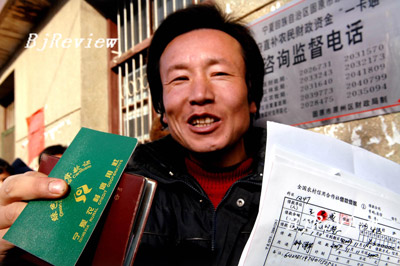
In spite of all his efforts, Zhang Zhibing failed once again to obtain bank loans to set up his poultry farm. He was unable to provide anything that could be mortgaged to the bank. Although he did live in a house, he didn't own it, as in the countryside farmers only have the right to use land but not own it.
Building a poultry farm is Zhang's dream. He had been working diligently to prepare all the building materials needed to set up a farm.
"According to my schedule, the poultry farm should be built by the end of February and the first flock of chickens should be born in March," Zhang said. "This fall, they can lay eggs and make a profit."
However, Zhang still needed much more money for his rural start-up-about 5,000 yuan-to hire workers to build the farm and for feed.
So Zhang's farm so far has only been a pipe dream.
For white-collar city workers, 5,000 yuan might not be a big deal. But for Zhang, it is the amount that separates a dream-come-true from the fantasy that he is destined to live with in his rural village in west China's Shanxi Province.
Zhang is not alone. Nearly all farmers in China's vast countryside have similar funding problems.
Statistics from People's Bank of China (the country's central bank) show that less than 60 percent of farming households can get loans from the banks, and the amount received was only a portion of what they had applied for.
The Ministry of Agriculture estimated that each year from 2000 to 2003, financial needs to the amount of 500 billion yuan from rural areas could not be fulfilled. That figure rose to 800 billion yuan in 2004 and 2005.
In a nation that is striving to improve living conditions for rural residents, the lack of loans is emerging as a major problem to reckon with.
Meager means
Zhang lives in a mountainous village in Shanxi Province where farmers use traditional methods and little is mechanized. Their farming income mainly depends on the weather. When the weather is good, they can harvest; when the weather is bad, they will be hit hard. There are numerous other rural villages like Zhang's in China.
In addition to farming, Zhang's folk villagers also take up sideline production. Zhang found that the egg price was rising and decided to raise chickens. The good thing about raising chickens is that he needn't worry about the feed because he grows corn and millet, which can feed 500 to 600 chickens. The profit gained from raising chickens would help maintain a sound living standard for his family.
But without proper financing, Zhang is doomed to suffer from the whims of weather.
The Chinese Government is pitching in to help, however.
There are at least seven financial institutions dedicated to rural financing, including Agricultural Bank, Agricultural Development Bank, Rural Commercial Bank, the postal savings system, and rural credit cooperatives.
But each financial institution has its own shortcomings. The banking business scope of the Agricultural Development Bank, a policy-oriented bank, is too small, mainly offering funds for the purchase, storage and transportation of grain, cotton and oil-bearing crops. The involvement of Agricultural Bank and Rural Commercial Bank in rural areas began to shrink in the 1990s. Further, although postal savings banks have a relatively big network in rural areas, their major business is to attract farmers' deposits and they are not responsible for issuing loans. Moreover, many farmers' deposits in postal
| 